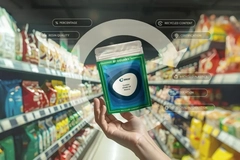UK DRS: Industry welcomes scheme operator and urges timely implementation

The UK Government, the Department of Agriculture, Environment and Rural Affairs of Northern Ireland, and Scottish ministers have selected the UK Deposit Management Organisation (UK DMO) as the DRS operator for England, Northern Ireland, and Scotland. While large industry players are represented in the DMO, non-profit sector stakeholders are demanding engagement.
The UK DMO is governed by a board representing drinks and retail sector players from the three nations, including Shepley Spring, Radnor Hills, Coca-Cola Europacific Partners, Heineken UK, Lidl, Tesco, and Co-op.
According to the UK DMO, trade associations representing large and small producers, major supermarkets, small convenience stores, and wholesalers have nominated the board members. Recruitment for an independent chair and non-executive directors is underway.

“The UK DMO needs to establish itself as quickly as possible as an organization, getting the necessary leadership team and finance in place. While this is happening, the board needs to swiftly establish engagement with all the sectors involved, including NGOs and nonprofits, which have played a key role in getting the DRS this far,” Sarah Horner, UK and Ireland director at Reloop, tells Packaging Insights.
“In the two years before the DRS is introduced, the UK will fail to collect around 17 billion drink containers. This loss is especially critical at a time when tariffs are rising and commodities like aluminium are becoming increasingly valuable,” she highlights.
Industry welcomes the move
The UK DMO says its responsibilities include designing and operating the systems that make the scheme work — “from producer registration to logistics, finance, fraud prevention, and public communications.”
 The UK DMO is governed by a board representing drinks and retail sector players.Gavin Partington, the British Soft Drinks Association director general, comments: “This appointment marks a key milestone in realizing the opportunities of a more circular economy, driving £1.13 billion (US$1.5 billion) of industry investment over the next three years and creating more than 4,000 jobs across England, Scotland, and Northern Ireland.”
The UK DMO is governed by a board representing drinks and retail sector players.Gavin Partington, the British Soft Drinks Association director general, comments: “This appointment marks a key milestone in realizing the opportunities of a more circular economy, driving £1.13 billion (US$1.5 billion) of industry investment over the next three years and creating more than 4,000 jobs across England, Scotland, and Northern Ireland.”
“The British soft drinks industry looks forward to playing our part in ensuring successful delivery of a DRS by October 2027.”
The British Retail Consortium, the Natural Source Waters Association, the Association of Convenience Stores, and the British Beer and Pub Association, welcomed UK DMO’s appointment.
The Federation of Wholesale Distributors and the Scottish Wholesale Association, the Northern Ireland Food and Drink Association, and the Scottish Grocers’ Federation also reacted positively.
Built by business, working for everyone
The UK DMO says that it is “built by business,” but “working for everyone.” In a joint statement, the UK DMO Board adds that the “DRS is an opportunity to deliver a transformational step forward in the circular economy in the UK and the appointment of the DMO is a major milestone in that journey.”
 According to Relopop, the UK will fail to collect around 17 billion drink containers by 2027.“We don’t underestimate the scale of the challenge, but our aim is simple — to build a system that’s fair, efficient, and easy to use. Our work is already underway, and we’ll be working closely with governments, businesses of all sizes, environmental groups, and consumer bodies to move forward as quickly as possible.”
According to Relopop, the UK will fail to collect around 17 billion drink containers by 2027.“We don’t underestimate the scale of the challenge, but our aim is simple — to build a system that’s fair, efficient, and easy to use. Our work is already underway, and we’ll be working closely with governments, businesses of all sizes, environmental groups, and consumer bodies to move forward as quickly as possible.”
Reloop’s Horner says that to maximize circular economy benefits of the DRS, the legislation for England and Northern Ireland, and the updated legislation for Scotland, should be “the blueprint.”
“What we need to see now is action from the UK DMO to make this blueprint into an operational plan and then execute it. The circular economy benefits are designed in because a DRS is in itself a circular economy benefit.”
Horner hopes that “the foot-dragging from certain players will now stop” and “the DRS will become a reality now that the UK DMO is appointed.”
She argues that the main challenges to DRS implementation so far “have been pushbacks from some elements of some sectors and the political delay due to frequent changes,” adding that “now we are past that.”
Horner concludes that if “the main hurdles are removed, then we can work through the teething issues collectively and know that problems that arise are real ones and not excuses.”












